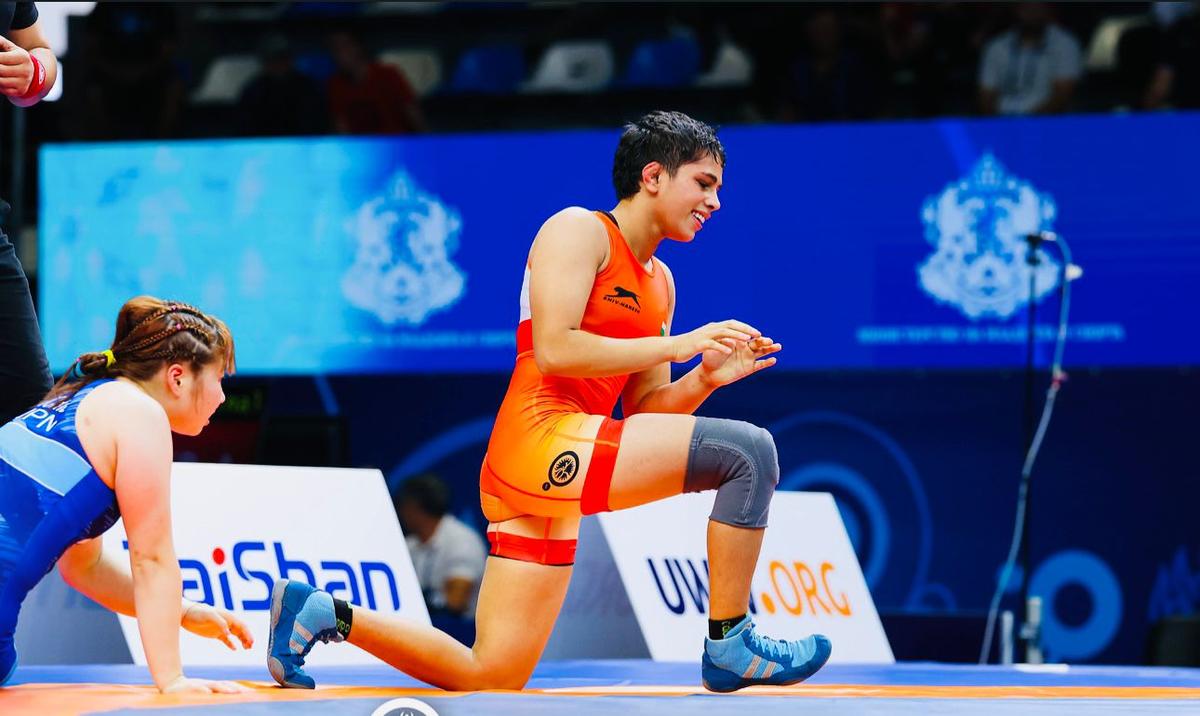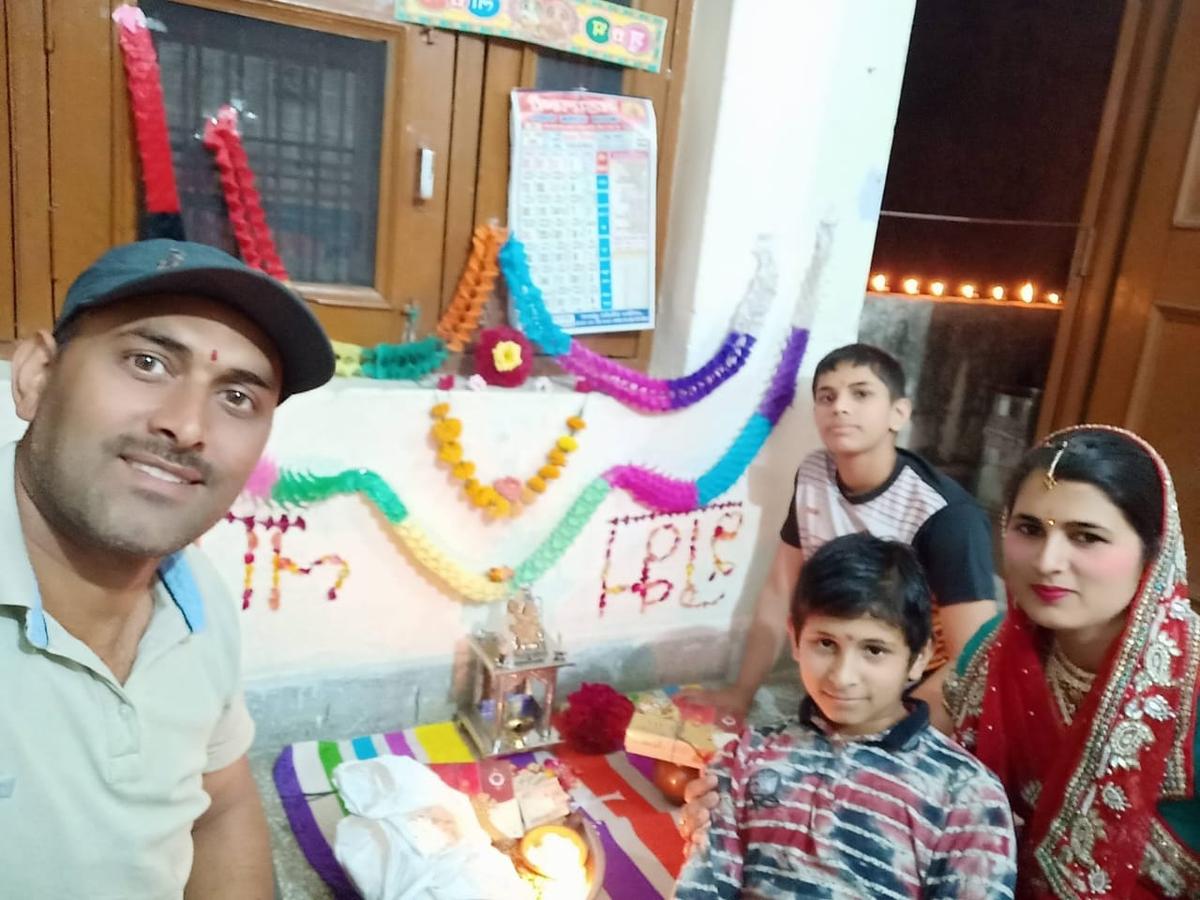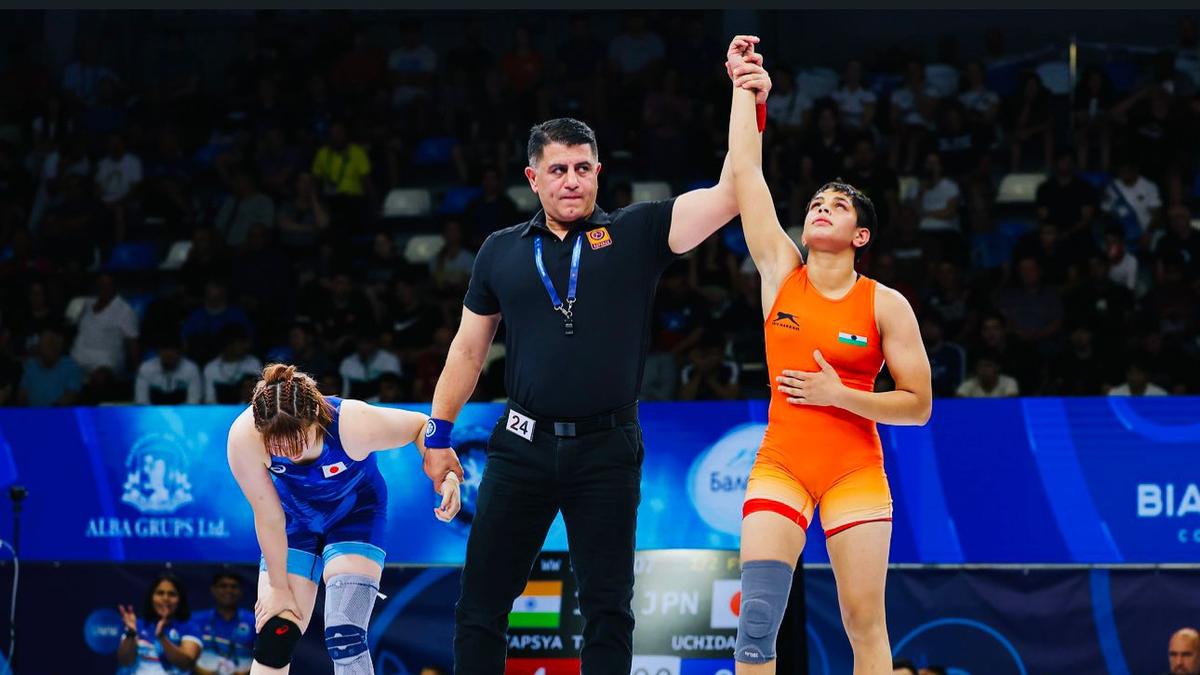Tapasya fulfils father’s dream, wins India’s first gold at 2025 Junior Wrestling World Championships
She might have just won a gold medal at the Wrestling Junior World Championships in Samokov, Bulgaria, on Wednesday, but celebrations will be muted at the home of Tapasya Gahlawat.
It’s just been a week since the 19-year-old’s grandfather suffered a fatal heart attack. Tapasya was at the national camp in Delhi preparing for the UWW Junior World Championships when she was informed of his passing.
When she wondered whether she should return home from the national camp, her father, Pramesh Gahlot, told her to stay and train. He reminded Tapasya of her grandfather’s last conversation with her – he had told her to come back home as a world champion.
She did just that. After coasting through the early rounds, she faced her biggest challenge in the semifinals — defending world champion Sowaki Uchida from Japan, who entered the competition with an unbeaten record in international wrestling. However, Tapasya broke the streak with a last-second takedown and edged out a narrow 4-3 win.
The final against Norway’s Felicitas Domajeva was smooth sailing, with her winning 5-2, to notch India’s first gold of the tournament.

Tapasya Gahlawat in action against Sowaki Uchida of Japan.
| Photo Credit:
Special Arrangement
Tapasya Gahlawat in action against Sowaki Uchida of Japan.
| Photo Credit:
Special Arrangement
Amidst the grief of losing a parent, Pramesh will allow himself to feel some pride.
When Pramesh’s wife delivered a baby 11 months into their marriage in 2006, there wasn’t the kind of happiness that might be expected after the birth of a first child. “It was a daughter, and people were disappointed. The women in the house were saying ‘ladki hi hui hai’, (It’s only a girl who has been born” he recalls.
Pramesh admits he was disappointed too, but for a different reason. Growing up in Khanpur Kalan village in Haryana’s Jhajhar district, he had always wanted to be a wrestler just like his grandfather, a prominent dangal wrestler.
ALSO READ: Engineer-turned-MMA figher Kaushik Saikumar plots his path to the UFC
He had even competed at the national school championships in 1999. His ambitions of becoming an elite wrestler, however, ended after he took a knee to the gut, which caused a severe internal injury that he never completely recovered from.
“When I learned that I could never wrestle again, I decided that I was going to make my son a wrestler to accomplish what I couldn’t. When I got married, I wanted to have a child without delay, so I could get started on that project. So when my first child was a daughter, my first feeling was that I wouldn’t be able to prepare a wrestler after all. But I didn’t like how some of my relatives were feeling sorry for me that I had a daughter. So I decided I’d make my daughter a wrestler after all,” he says.

As soon as Tapasya was able to run around, her father, Pramesh (left,) enrolled her in the local village akhara.
| Photo Credit:
Special Arrangement
As soon as Tapasya was able to run around, her father, Pramesh (left,) enrolled her in the local village akhara.
| Photo Credit:
Special Arrangement
It was a big ambition, Pramesh admits. “I knew her journey was going to be a hard one, so I gave her a name which I felt was appropriate,” he says. The little baby girl was named Tapasya, which translates to penance – a voluntary endurance of hardship for a spiritual purpose. But it’s also a word that many Indian wrestlers use to describe the act of practice itself.
As soon as Tapasya was able to run around, Pramesh enrolled her in the local village akhara. She was the only girl there. Her grandfather and other elders in the family were against the choice at first. “They said you can’t have a girl wrestling. I used to give examples of all the girls who were wrestling and doing well, like Geetika Jakhar and Geeta Phogat, but those days were extremely frustrating. I used to take God’s name and continue doing what I was doing,” says Pramesh.
It wasn’t just his elders Pramesh had to convince. “Tapasya also didn’t want to be a wrestler at the start. She was very good at her studies. She used to tell me she wanted to become a doctor. But I always felt there were enough doctors and that it would be special to win glory for India,” he says.
Pramesh’s persistence slowly wore down opposition. When the 10-year-old Tapasya won in a state school championship, his family came around. Tapasya’s grandfather, who had once been against the prospect of his granddaughter wrestling, became her biggest supporter.
The family’s backed her to the hilt ever since. In 2019, Tapasya started training with coach Kuldeep Rana and Samiksha Kharb at Sonepat’s Yudhvir Akhara. Pramesh subsequently constructed a two-room house near the akhara, bought a milch cow, and moved his family there to ensure his daughter would face fewer disturbances.
ALSO READ: From mud pits to the track: The inspiring tale of Shahnawaz Khan jumping towards glory
“I’m a farmer, but my main job is to make sure Tapasya has everything she needs and can focus on her wrestling,” he says.
In 2024, Tapasya won silver in the women’s 57kg category at the national championships in Jaipur and gold at the Asian U-20 Championships in Bangkok. She followed it up with a gold at the National Games in Dehradun and the National Championships in Bangalore this year, and topped it with the win at Samokov.
Despite all the accolades, Tapsya knows there are bigger prizes to be won. She is also part of the Indian squad that will be competing at the senior World Championships in Zagreb, and a strong performance there will be critical if she has to stand out in a division that has no shortage of talent in India.
“Abhi aage aur jana hai. Abhi aur mehnat karni hai. (She has to go very far still. She has to continue to work hard,” says Pramesh.
Published on Aug 20, 2025



